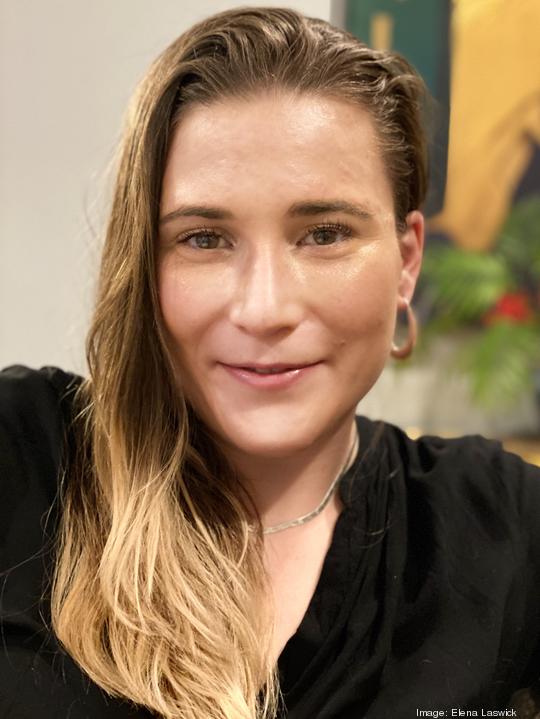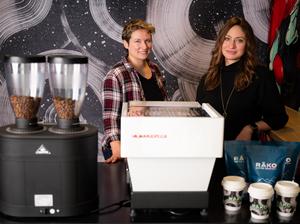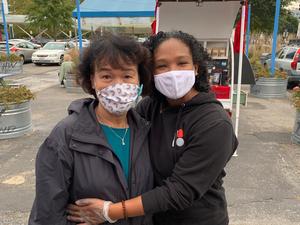About the business: Amano Marketplace is an online fair-trade store where more than 1,000 Guatemalan and Peruvian artisans share their designs and their stories, and where customers can participate in virtual experiences.
How it started: Elena Laswick, a D.C.-area resident since she was 16 and graduate of the College of William & Mary, and Brooke Loving Bagwell, an Austin, Texas, native and graduate of American University, were aware of each other’s work as the pandemic threw their respective lives into chaos.

Still, they were on separate paths: Laswick as founder and designer of Guatemalan slow-fashion brand Ixil Collective, and Bagwell, founder of the Peruvian Artisans of Inti apparel line.
But when Covid-19 brought tourism to a halt, shutting off a primary source of revenue for the artisans Bagwell supported and leaned on in Cusco, Peru, she reached out to her fellow designer — and found a new partner 2,000 miles away in Guatemala.
“I was just anxious and feeling alone and trying to figure out how to support my artisan partners, more from an emotional place,” Bagwell said. “Luckily, Elena responded and was really open to collaboration.”

Laswick had just incorporated Ixil Collective in November 2019. While she put her items online for retail sale, her larger plan was to grow her business partnerships by attending conferences and fairs and grow her studio through wholesale. Covid put an end to that.
“It was a life raft and, of course, I’m jumping on,” she said of Bagwell’s outreach.
With a small investment of between $5,000 and $7,000, Amano Marketplace was born — and fast. The idea was pitched in June 2020 and was online by Oct. 1 of last year, with the company incorporated in Arlington. Laura Spillari, founder of Xibalba Studio in Antigua, Guatemala, serves as the company’s first artisan liaison.
Amano offers accessories, apparel and home goods from leather wallets and jade jewelry (with jade collected by the artisan from the river on their own land), to textile face masks, pine coasters and a host of goods produced by Alpaca farmers.
While not officially certified as fair trade, Amano Marketplace does abide by its 10 principles as it pursues that label. Among them: only handmade goods, no child labor, only Forest Stewardship Council-certified wood, living wages for artisans, transparent cost structure, and commitments to gender equality and nondiscrimination.
“When you buy a product from us, you’re directly supporting indigenous communities, specifically women and children, and also contributing to the artisan’s heritage,” Bagwell said.
Pandemic effect: Amano Marketplace was born from the pandemic, an online store where artisans and entrepreneurs — those who may have competed in a pre-Covid world — joined forces to uplift everyone.
“I think it was very easy to go around to people I’d heard about, and all of them were in the same boat — no one had had to rely 100% on retail sales,” Bagwell said. “Everyone was just looking for other options, collaborations, anything that might be able to help. For that reason, there were so many people saying, ‘We have nothing to lose.'”
Pandemic pivot: While a new business, Amano Marketplace has already added a fairly new offering: the experience. It's held prerecorded workshops on pom-pom tassels, bead looms, natural dyeing and bird embroidery, for instance. The classes run from $46 to $73.50, and there are upcoming live sessions as well.
That part of the business is bound to grow, as Amano has a deal to offer its experiences on Amazon's Explore platform.
Challenge: "We are still pretty new," Laswick said.
And that puts Amano Marketplace at a disadvantage, especially with the cost of competing in an online retail space. Ads are expensive, as is search engine optimization "if you don't have years and years of Google accumulating your data organically."
Those challenges are partly why both Laswick and Bagwell are working other jobs even as Amano Marketplace chugs on. It's also why they are working with Start Small Think Big, a nonprofit that helps small businesses with high potential but few resources connect with legal, marketing and financial services.
What's next: Sales are expected to pick up for Amano as it heads into the fourth quarter, the holiday season. What's next is still to be worked out, but there are "many ideas on the horizon," Bagwell said, including growing its experience offerings and getting into the corporate gift space.
"We are going to be taking through the end of this year to reflect, ask how do we scale this," Bagwell said. "It’s one sale for one sale, it’s bits and pieces, and what we want is a machine that runs."
Email mneibauer@bizjournals.com to share your business with us.




